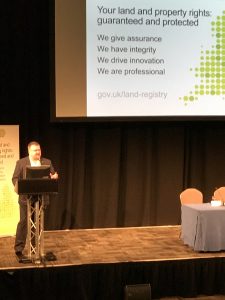Last week, I attended the National HM Land Registry Conference on their Local Land Charges project. As you all know, the Land Registry is embarking on the task of centralising all Local Land Charges registers into one central database. I would like to summarise the main points as follows:
- The task – is to centralise a system which produces the transfers involved in 4 million transactions per annum. There are 24 million registered titles in England and Wales. Surprisingly, I thought, only 83% of land is registered.
- The market – is generally 2% up post referendum , which has taken them a bit by surprise and they have suffered some under resourcing in some areas recently as a result.
- Privatisation – Not imminent. Despite previous announcements, the privatisation was not included in the “National Infrastructure and Privatisation Bill”
- The process – the task is to centralise the records of 326 Local Councils, a total of 26 MILLION registered charges. Of course, there is a variety of methods and modernisation across the country. Only 213 Councils have purely electronic registers, 11 are still paper only, while 100 have a hybrid mixture of the two. The migration of the date to HMLR is not an extra burden for the LA’s , it is a duty under the 1977 Act.
- The process and timeline – Last year, the message was that London Councils would be the first to migrate, but this was decided not desirable as it would not give a true reflection of the scale and diversity of the process ahead. It is now intended to announce , by the end of 2016 a list of about 10% of the total, who will comprise “Phase One” of the process starting in 2017. Phase two will start in mid-2017. Once each authority has migrated their data, they can close their Land Charges office and all enquiries will go through HMLR. By 2023 the task will be complete.
- Queries – I raised with the Program Manager the issue of where the source documents for each charge would be held, and, therefore, where any queries would be directed. I was assured that they would still be held by the District Councils under their duty as the originating authority for the charge. The problem will be that there will no longer be a Land Charges officer at that Council to direct our queries to, should they arise.


